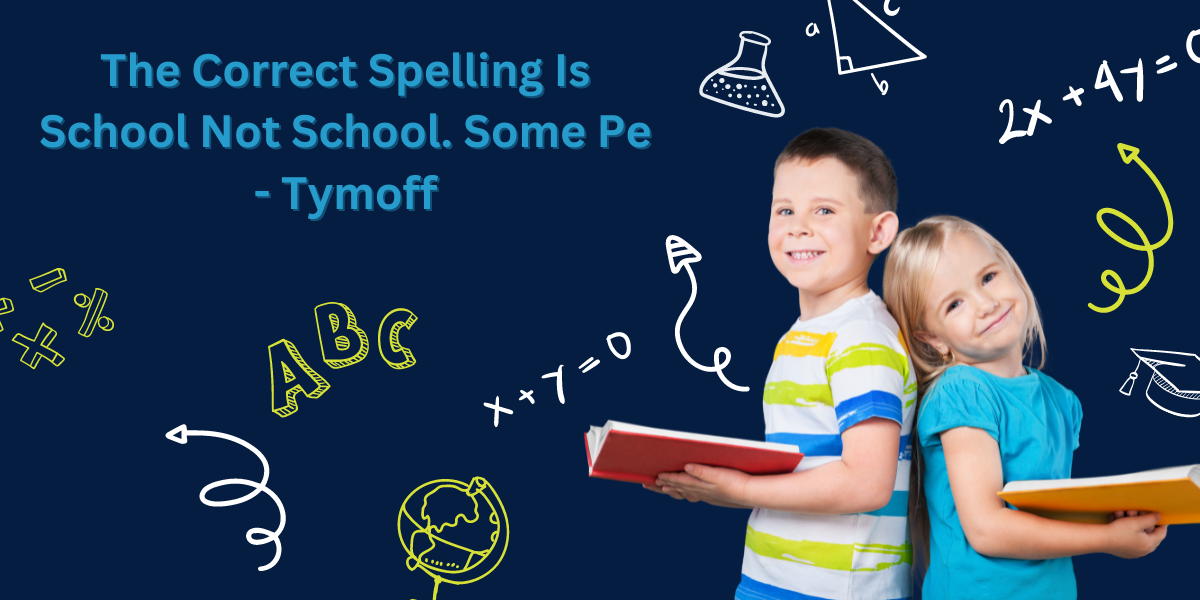Have you ever stumbled upon a curious misspelling that made you do a double-take? If so, the phrase “the correct spelling is school not scool. some pe – tymoff” might just catch your eye. It’s ironic how a simple word like “school” can become fodder for confusion and playful language quirks. In this digital age, where autocorrect often fails us and slang reigns supreme, it’s easy to see why mistakes happen. But understanding the roots of these errors can be both enlightening and entertaining. Join us as we delve into the reasons behind common misspellings, explore their history, and discover tips to keep our writing clear and accurate!
Outline for “The Correct Spelling Is School not school. some pe – tymoff”
Exploring the phrase “the correct spelling is school not school. some pe – tymoff” reveals a fascinating journey into language and its quirks. This blog will dissect common misspellings, particularly focusing on “school.” By examining how this word has been miswritten over time, we can better understand the perplexities of English.
Additionally, we’ll investigate why people might spell it as “scool” and consider factors like autocorrect that contribute to these errors. Playful language aspects such as slang also play a role in this narrative, making it essential to recognize the significance of proper spelling in communication.
Also Read:-Can Tonsils Grow Back After Being Removed||Meet Nala Cat
What are You Looking for?
When searching for the correct spelling of “school,” it’s essential to understand what you are looking for. Many people often confuse its spelling, leading to various interpretations and misunderstandings. Are you aiming for clarity in communication or simply trying to improve your writing skills?
Understanding the nuances of language is vital. With so many distractions in today’s digital world, such as autocorrect features and casual texting styles, it’s easy to overlook proper spelling. This blog aims to clarify why “school” is spelled with an ‘h’ while addressing common misconceptions surrounding this crucial word.
Also Read:-Meet The Iconic Couple||Shared Joy Is A Double Joy||Brandon Marsh Wife
The Correct Spelling is School, Not school
When discussing the correct spelling, it’s essential to emphasize that “school not school” is the accurate form. Although it may seem trivial, using lowercase letters erroneously can lead to miscommunication and misunderstanding.
The word “school” has deep roots in educational contexts, representing a place of learning and growth. Emphasizing its correct spelling helps maintain clarity and professionalism in written communication across various platforms. Consistency matters, especially in academic settings where precision is vital for conveying ideas effectively.
Also Read:-I Fear No One, But Respect Everyone||IncreaseUpCard.org||Showbizztoday.com
Common Misspellings and Confusions
Misspellings of the word “school” often arise due to phonetic similarities with other words. Common mistakes include “scool,” “shcool,” and even “skool.” These variations can confuse readers, especially in educational contexts where clarity is crucial.
Additionally, some people might mix up “school” with related terms like “schooled” or “scholar.” The subtle differences in pronunciation can lead to errors, particularly for non-native speakers. Understanding these common pitfalls helps improve spelling accuracy and communication skills.
Genesis of Word School
The word “school” originates from the Greek term “scholē,” meaning leisure or free time. In ancient Greece, it referred to a place of learning where students engaged in philosophical discussions and scholarly pursuits during their leisure hours. This concept evolved as education became structured.
As Latin influenced European languages, “scholē” transformed into “schola.” Eventually, this led to the Old English adaptation “scol,” which paved the way for our modern spelling. Over centuries, schools have transitioned from informal gathering places to formal institutions dedicated to educating generations across various subjects.
Also Read:-Ed Sheeran Details||Famous Parenting Chelsea||Build Insane Triceps
Investigating the History of Wrong Spelling
The history of wrong spelling often stems from the evolution of language itself. As languages develop and borrow from one another, inconsistencies in spelling can emerge. The word “school” has roots in ancient Greek and Latin, with variations appearing over centuries that contributed to common misspellings.
Cultural influences also play a significant role in how words are perceived and written. With the advent of technology and social media, informal communication has led to an increase in phonetic spellings like “scool.” This shift highlights our ongoing relationship with language as it adapts to contemporary usage patterns.
Strangeness of “School” & Why Correct Spelling Matters
The word “school” carries an air of familiarity, yet its spelling can perplex many. Why does it contain a silent ‘h’? This quirk highlights the complexities of English phonetics and etymology. The strangeness lies in how simple words can become challenging through unexpected rules.
Correct spelling is crucial because it ensures effective communication. Misspellings can lead to misunderstandings or diminish credibility. When someone writes “school” instead of “school,” the intended meaning may be lost, affecting both academic and professional contexts. Recognizing this importance encourages attentiveness to detail in our daily writing habits.
Also Read:-The 1982 Movie Poltergeist||Self-Control is Strength||Learn to Sit Back and Observe
Why Do People Misspell “School” as “School”?
Many people misspell “school” as “school” due to phonetic confusion. The English language often presents challenges, especially with vowel sounds. Some individuals may hear the word pronounced quickly and misinterpret its spelling.
Additionally, typing errors play a significant role. In the fast-paced world of texting and online communication, fingers can slip on keys. Autocorrect features might not always catch these mistakes, leading to common misspellings like “scool.” This highlights how technology can contribute to spelling errors in our daily lives.
Significance of the correct spelling is school not school. some pe – Tymoff
The correct spelling of “school” is crucial in communication. It reflects professionalism and attention to detail, particularly in academic and formal contexts. Misspellings can lead to misunderstandings or diminish credibility.
Moreover, the phrase “some pe – tymoff” introduces a playful twist on language that highlights how words evolve over time. This whimsical approach underscores the importance of accurate spelling while also sparking curiosity about linguistic trends. Emphasizing correct spelling fosters clarity and helps maintain the integrity of our shared language.
Tips to Prevent Misspelling “School”
To prevent misspelling “school,” start by familiarizing yourself with the word. Write it down multiple times, emphasizing the correct letters and their order. This kinesthetic approach helps reinforce memory.
Additionally, practice using “school” in sentences regularly. Reading books or articles can also improve your spelling as you become accustomed to seeing the word correctly used in context. Consider using flashcards for quick reviews or quizzes to keep your skills sharp and confidence high when writing.
Impact of Autocorrect on Spelling
Autocorrect features in smartphones and computers have transformed the way we communicate. While they aim to enhance our writing, they can sometimes lead to confusion. For instance, typing “school” may inadvertently result in a misspelled version due to autocorrect’s suggestions or corrections.
This reliance on technology can create complacency over time. Users might become less attentive to spelling rules, assuming that their devices will automatically fix errors. As a result, even simple words like “school” could be misspelled more frequently if one isn’t careful with typing habits and settings.
Playful Language and Its Effect – ‘Pe – Tymoff’ and Slang!
Playful language, like using slang or creative spellings such as “pe-tymoof,” adds a layer of fun to communication. This type of expression can foster camaraderie among peers and create a sense of belonging within certain communities. It often reflects cultural trends and shared experiences that resonate with specific groups.
However, this playful approach can lead to confusion when it comes to standard spelling. While it may seem harmless in casual conversations, relying on unconventional spellings might hinder clarity. Understanding the balance between playful language and proper spelling is essential for effective communication across different contexts.
Role Of Dictionaries And Spelling Tools
Dictionaries and spelling tools play a crucial role in ensuring correct language usage. They provide clear definitions, pronunciation guides, and examples of proper grammar. When it comes to tricky words like “school,” these resources can help reinforce the importance of accurate spelling.
With advancements in technology, digital spelling tools have become increasingly popular. These applications not only highlight errors but also suggest corrections in real-time. This immediate feedback helps users learn from their mistakes and improves their overall writing skills over time, making them invaluable for anyone looking to enhance their communication abilities.
Conclusions
Understanding the nuances of spelling can significantly impact communication. When discussing the phrase “the correct spelling is school not school. some pe – tymoff,” it’s clear that awareness matters in both written and spoken language.
Spelling errors, like confusing “school” with alternative forms, can lead to misunderstandings. Emphasizing proper spelling fosters clarity and professionalism in our interactions. The importance of mastering such details cannot be overstated as they reflect on one’s attention to detail and education level.
FAQs
Q. What is the correct spelling of school?
The proper way to spell it is “school,” with an ‘h.’ Any variation, such as “scool,” is incorrect.
Q. Why do people mix up school and scool?
Distractions in communication or phonetic pronunciation can lead to misspellings. Additionally, autocorrect features may contribute to mistakes.
Q. Is there a significance in getting it right?
Absolutely! Correct spelling fosters clear communication and showcases professionalism in writing
Q. How does slang influence our understanding of words like school?
Slang often simplifies language, but it’s essential not to let these variations affect formal writing standards.
Q. Are there resources for improving my spelling skills?
Yes! Dictionaries, online tools, and educational apps are excellent resources for anyone looking to enhance their literacy skills.



